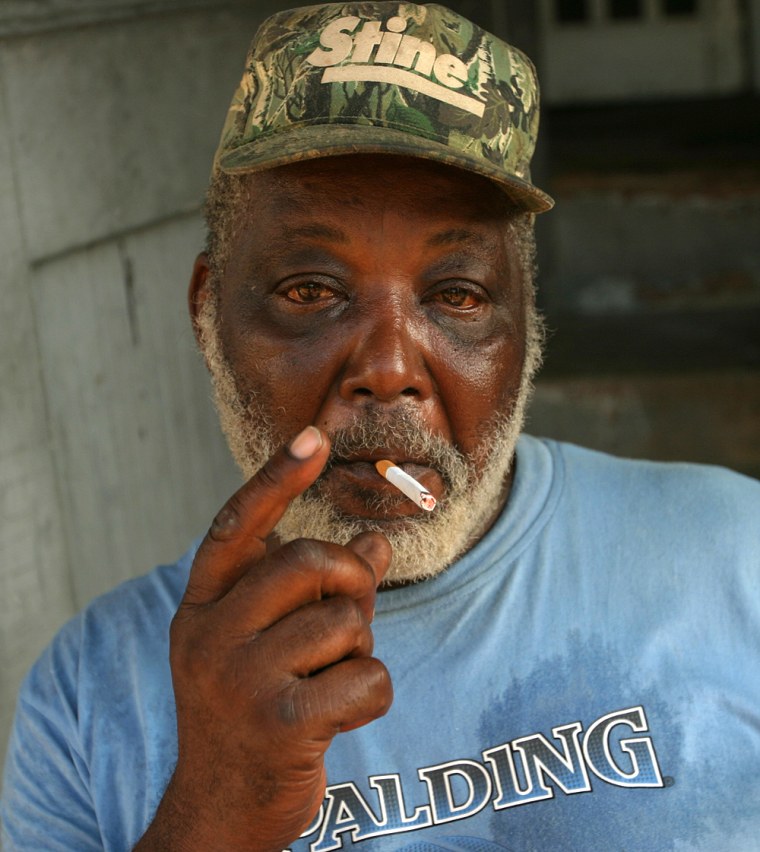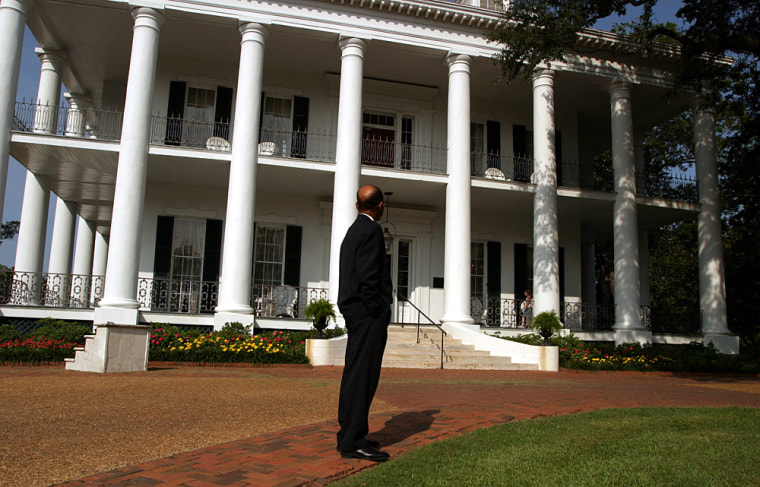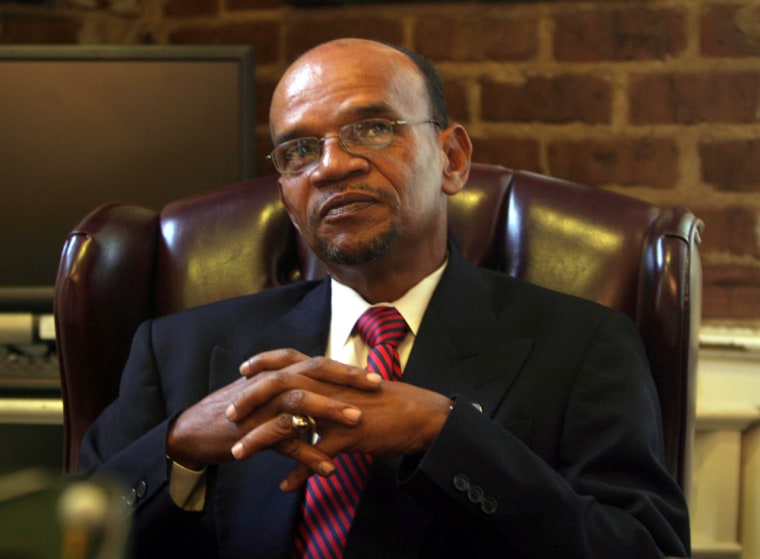Growing up in Natchez, Miss., Phillip West said he didn’t believe that the city better known for its antebellum mansions than its racial tolerance would elect a black mayor in his lifetime. Now, just six weeks after taking office as the first African American to hold the city’s highest office since Reconstruction, he still finds himself shaking his head in amazement at the changes he has seen in his 57 years.
“To have gone through that experience (growing up in a racially segregated city) and now to be the mayor is something I could never have imagined,” he told us during a visit on the 11th day of our two-week trip the length of the Mississippi River. “… I didn’t even know where City Hall was.”
As we’ve ventured deeper into the deep South along the mighty river, we’ve found ourselves wondering to what degree race remains a dividing line in the early years of a new century. And West’s election provides a convenient window through which to view the current state of race relations in a city that has seen its share of hate and betrayal in the 139 years since the end of the Civil War.
The second black mayor of NatchezSurprisingly, Natchez had one previous black mayor, Robert Wood, who built the city's first black school in 1871. His election was part of a short-lived political shift known as the “black and tan revolution,” which saw Mississippians elect blacks to half the state offices in 1873.

West, a slight, chain-smoking former state legislator, Adams County supervisor and longtime NAACP official, is Wood’s long-awaited successor, having taken office on July 1 after winning three elections in five weeks – a Democratic primary, a runoff in which he defeated incumbent Mayor Hank Smith, and a general election in which he edged Republican candidate Sue Stedman.
While many black mayors have been elected in Mississippi and other southern states in recent years, West said he considers his victory historic because it occurred in a city with a population that is almost evenly divided between black and white residents.
“Most African American mayors who are elected in this state are elected from cities that have 60- 70-, 80-percent black population,” he said. “… I was elected in a city where it’s actually 50-50 at best.”
While that might appear to suggest that race is no longer a deciding factor at the polls, a closer look at the results indicates that is not the case.
West’s margins of victory in the runoff and the general election – 106 and 100 votes, respectively – were razor thin in a city with a population of more than 18,000, and the voting largely followed racial lines, with West virtually sweeping the black vote and his opponents, both of whom are white, capturing almost all of the ballots cast by white voters.
Hoping to bridge that divide, West has stressed the themes of unity and jobs in his first six weeks on the job in Natchez, which has lost some 4,000 jobs in recent years to the closings of a local tire plant and two paper plants.
“We have an opportunity to focus in on those kinds of things that are important for the quality of life for all of our citizens,” he told us while showing off some of the sights of the historic river town. “And I think we have an opportunity to bring a community together that hasn’t been together for many, many years ... to move beyond the negatives of the past and to a more positive future.”
Natchez residents we talked to during our visit indicated that they agree with that direction.
“Natchez’s economy has got it bad,” said Bobby King, a radiator repairman who is white. “I hope he brings in more industry.”

Fred Washington, a black man, said he is “sick and tired” of looking for a job with decent pay and is hopeful that West will be able to revitalize the economy.
”I’m glad he’s mayor,” he said. “… It’s long overdue. I hope it brings us together.”
But some Natchez residents say the mayor has been exaggerating the extent of the racial divide.
“I’m not sure I understand what you mean by racially divided,” said Smith, the former mayor who lost to West in the Democratic runoff. “... We’ve got race issues. Anywhere you go in the South, anywhere in this country you’ve got race issues. Mississippi, I don’t think, is any worse, and I don’t think it’s any better.
“The media focus is continuing to imply that Mississippi is … full of racists and bigots.”
The Forks in the Road
Such criticism may arise from West’s stated goal of having the city come to terms with the uglier side of its storied past.
He has made it a priority to ask the owners of the city’s antebellum mansions -- Natchez’s top tourist attraction -- to present a balanced picture of plantation life. Black leaders have long found fault with many of the historic showcases, charging that they present an idealized version of the Old South that minimizes the horrors of slavery.
“There has been a resentment … (over) the mansions and the kind of either half stories or not truly accurate stories,” he said. “… It’s been kind of a love-hate kind of thing, but now I think the hate would be subsiding … because all of us recognize that we must embrace the real truth about who we are, where we are in order to be able to move forward for the future.”

West and other city officials also are moving forward with plans to commemorate the Forks in the Road, which was the site of the second-biggest slave market in the South, after New Orleans. While plans are still being finalized, they are hoping to find money to build a museum on the property, which is currently marked only by a sketchy state placard erected in 1998 and a shuttered gas station.
West said that his desire to mark the city’s sad chapters as well as its history as a vital center of life on the Mississippi springs from having seen the darker side of Natchez first hand.
West, the seventh of 12 children, grew up on Vinier Street, a part of the city where all he had to do was look out his front door to be reminded that segregation was in full force.
“The white families all lived on one side of the street and the blacks on the other,” he said as he sat on the stoop of the two-bedroom house he grew up in. “We played together with the white kids, but then when we got older we all got separated. I didn’t understand it then, but I do now.”
He also experienced the hatred and violence that were aimed at leaders of the civil rights movement in the 1960s.
West was among the black workers who filed a civil rights suit against the Armstrong Rubber Co at the time, alleging discriminatory promotion practices at its Natchez tire plant. The tensions boiled over in 1966 when NAACP leader Wharlest Jackson was killed when dynamite was planted in his truck shortly after he accepted a promotion to what had been a "whites-only" position.
A year earlier, West had a personal encounter with that same kind of hate.
While accompanying his father, Charles, on a drive to pick up his godmother in January 1965, West said that a white man in a station wagon began harassing them on a country road in neighboring Franklin County, repeatedly passing their Chevy Nova and then slowing well below the speed limit to force them to pass. Then, when they attempted to pass his vehicle, the man sped up and nearly forced the Wests into a head-on collision with an oncoming car.
Fearing that the man was a Klansman bent on murder, Charles West turned their car down a gravel road and banged on the door of the first home they found, a ramshackle shack whose resident refused to open the door. Moments later, they ducked behind the house as the station wagon came peeling down the road.
West remembered watching as a big white man climbed out and came toward the house with a flashlight and handgun. As he drew nearer, father and son ducked from side to side behind the building as the man played his light along the sides.
“Fortunately, he never came around to the back,” West said.
After the man left, the Wests climbed back in their car and continued down the gravel road, hoping it eventually would return them to the highway. But they remained fearful that the man had gone to find some friends to bottle them up in a trap.
”The most chilling words to me that my father uttered … during the course of this was, ‘Philip, if they’ve got the road blocked, all I can tell you to do is close your eyes,’” West recalled.
The next day West left Natchez to attend college at Alcorn State University, in Claiborne County, about midway between Vicksburg and Natchez.
He was drafted in 1969 and served 2 ½ months in the Army before being diagnosed with a painful foot condition and given a medical discharge.
But he said the frightening experience of that night stayed with him, and led him to pursue a career in politics.
Almost 40 years later, that decision has taken him to a pinnacle he never thought he would reach.
“A door has been opened, and once that door is opened it is open forever,” he said. “The next person who may look like me who may seek this position won’t necessarily be elected or not elected based on his race, but based on his qualifications.”
After spending the morning with West, and checking out two of Natchez’s beautifully restored plantation homes – the Dunleith and the Monmouth – we again turned our van southward and set out for St. Francisville, La., a historic town at the eastern bend of the Louisiana boot that is home to the biggest tree east of the Sierra Nevada.
Reporter and media producer Jim Seida are traveling the length of the Mississippi in August and will be filing daily dispatches along the way. MSNBC contributor Beau Harrison contributed to this report. If you have a question or comment, mail us at mississippi@msnbc.com.
